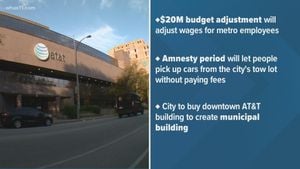A U.S. Senate panel is taking aim at the increasing practice of airlines charging customers what are being labeled as "junk fees". This move follows the release of a new report from the Senate Permanent Subcommittee on Investigations, detailing how five major airlines are reportedly reaping substantial revenue from these often opaque fees.
The hearing, slated for December 4, will feature executives from American Airlines, Delta Air Lines, United Airlines, Spirit Airlines, and Frontier Airlines. Sen. Richard Blumenthal, the subcommittee's chair, emphasized the urgency of this inquiry on Tuesday, just as millions of travelers prepare for the Thanksgiving holiday.
According to the report, airlines such as Frontier and Spirit have been found to incentivize their gate agents to enforce bag policies stringently, resulting in passengers often facing extra charges—sometimes needlessly. From 2022 to 2023, these two low-cost airlines reportedly paid $26 million to agents for enforcing baggage fees, aggravation many travelers feel is unjust, especially during busy travel periods.
Blumenthal stated, “This report pulls back the curtain on tactics like dynamic pricing, which burden travelers and boost airline revenue. These charges have no basis on the actual cost of services provided but simply fatten airline profits.”
One of the major issues raised by the subcommittee is the trend of "unbundling," which refers to airlines charging separately for services once included in the ticket price, such as seat selection or carry-on bags. Over the past two decades, this trend has only compounded costs for consumers.
The Senate report notes the astonishing rise of ancillary fees over the years, stating these fees generated $12.4 billion for the five airlines studied between 2018 and 2023—a staggering amount considering these additional costs were virtually non-existent two decades ago. Passengers now regularly face unexpected fees, from hefty costs for checked bags to charges for obtaining preferred seats on flights, all of which were once included as part of the ticket price.
When it analyzed pricing strategies, the report highlighted how some airlines utilize algorithms to adjust pricing dynamically, leading to different customers potentially paying varying amounts for the same services at any tack of the same flight. This practice not only complicates travel planning for consumers but leaves them questioning the transparency of the pricing process.
Senator Blumenthal remarked, “It’s frustrating to see so many passengers loading their bags just to be hit with fees at the last moment. During one of the busiest travel seasons of the year, this burdensome pricing serves only to line airline executives’ pockets.”
Despite pushback from airlines' representatives, who defended their fee structures as necessary to meet competitive pressures and consumer demands, the Senate is urging increased scrutiny on these pricing tactics. The Airlines for America trade group released its response, stating it is “deeply disappointed” and claiming the report fails to appreciate the competitive nature of the U.S. airline industry.
Each of the airlines has stated they are rooted in providing choices for consumers, allowing them to effectively pick and pay for the services they actually utilize. Yet, the narrative of rising fees seems to indicate otherwise, with consumer complaints on the rise and the public feeling overwhelmed by unexpected charges. Some 79.9 million travelers are projected to fly during the holiday season, according to AAA, showcasing just how many passengers are impacted by these practices.
The impending congressional hearing will provide airlines the platform to defend their practices, but pressure continues to mount on the industry as calls grow to reevaluate oversight practices surrounding ancillary fees. Many are watching closely to see if this inquiry leads to meaningful changes or whether airlines will maintain their current course.
At the heart of the matter lies the broader question of whether airlines can operate transparently and fairly. With notable public frustration, especially surrounding holiday travel, it appears the airline industry may need to adjust course to regain travelers’ trust and confidence.
This isn’t just about airlines and their customers; it’s also about ensuring the integrity of the airline industry as a whole. If consumers are to have any hope of flying without surprise charges walking out of airports, the future of airline fees and pricing needs careful consideration. With the December 4 hearing approaching quickly, all eyes are now on Congress, airlines, and the consumers eagerly awaiting change.



